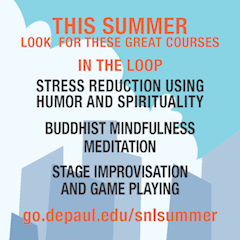
Six days before President Donald Trump would celebrate his 100th day in office, former President Barack Obama returned from a self-imposed exile for a roundtable discussion at the University of Chicago. Passing the political baton to young leaders, Obama urged those in the room — many of them students and young leaders themselves — to get involved in their communities and the world around them.
The event was as low key as the return of a president to public life could be. Hosted at the university’s Logan Performance Center, there wasn’t much fanfare for the former president. The crowd however, which also included teachers, advisers and the city’s media outlets, enthusiastically waited for Obama.
Lincoln Berget, a senior at DePaul, said it was encouraging to see Obama focus on empowering youth in leadership roles, as they were a decisive demographic for his wins in 2008 and 2012.
“The most beneficial thing I took away from the discussion is that (Obama) is actually taking the time to listen to the concerns of the youth,” Berget said. “We face huge issues including climate change, inequality and extreme partisan polarization. (…) Massive student debt is a common occurrence today. At least Obama is holding events like this where these topics can be discussed in greater detail.”
Obama’s connection to young people helped him get elected twice. In 2008, 66 percent of people within the 18 to 29 age bracket casted their votes for Obama, according to the Roper Center. In 2012, around 60 percent casted their votes for him. Those who showed up for the talk at the University of Chicago seemed to fall largely within this group.
In the auditorium, Obama took the stage with six students and graduates who represented universities throughout Chicago — though not DePaul — to talk about topics and issues related to civic engagement and community service. Obama started by telling a story of how he got involved in community service in Hyde Park. He learned a foundation there, he said, that he would build on as he climbed the political ladder to become president.
Those on the stage with him had done similar things in their own communities. Tiffany Brown, a pharmacist and published author who attended Chicago State University, started off in her community and continues to give back. Ayana Watkins, who attends Kenmore Academy and is creating her own fashion line, does the same.
The panelists and the former president enforced the idea that community service and civic engagement were essential to creating change. Start where you are and do what you can — reach out to others with similar interests and build on common experiences.
Emma Finkbeiner, a graduate student at DePaul who was able to attend thanks to a raffle by the Student Government Association, was “thrilled” for the opportunity to see the former president and to hear what he had to say about political involvement.
“I think especially for young people he’s always been someone who has targeted young people to get involved from the voting process to everything after the voting process,” Finkbeiner said. “For him to say ‘I want to talk to people about getting involved in their communities so they can make a difference’ with the political climate right now it’s a great way to show people how they can affect their own neighborhoods.”
Young people, he would say or allude to at various points during the roundtable, are the future.
Kelsey Hershenhouse, a senior marketing major, felt that the perspective the president gave could help students like her see the problems around them.
“I think he was able to give some really great perspective as to how we, as students, can show up in a variety of ways, whether that’s for human rights or just any type of issue going on in the city or around the world,” Hershenhouse said. “He had that presence of wanting to have a discussion and gave us his perspective of what he’s seen.”
Obama dispensed some wisdom for the young leaders on stage and in the audience. Throughout the nearly hour and a half-long conversation, the young leaders on the panel, many of them already involved in community engagement and service, would answer his questions on news judgment, talking to people with opposing viewpoints (and why it’s become so difficult) as well as how they talk to their peers about voting and being involved in their communities.
Absent from the conversation was any mention of his successor President Trump. But the former president did circle back to the country’s current political climate and what those in the room could do to bridge the gap, or cross the aisle, to change it.
“When I said in 2004 that red states or blue states, they’re the United States of America, that was aspirational comment, and it’s one that I still believe,” Obama said during the event. “When you talk to individuals one-on-one, there’s a lot more that people have in common than divides them.”

